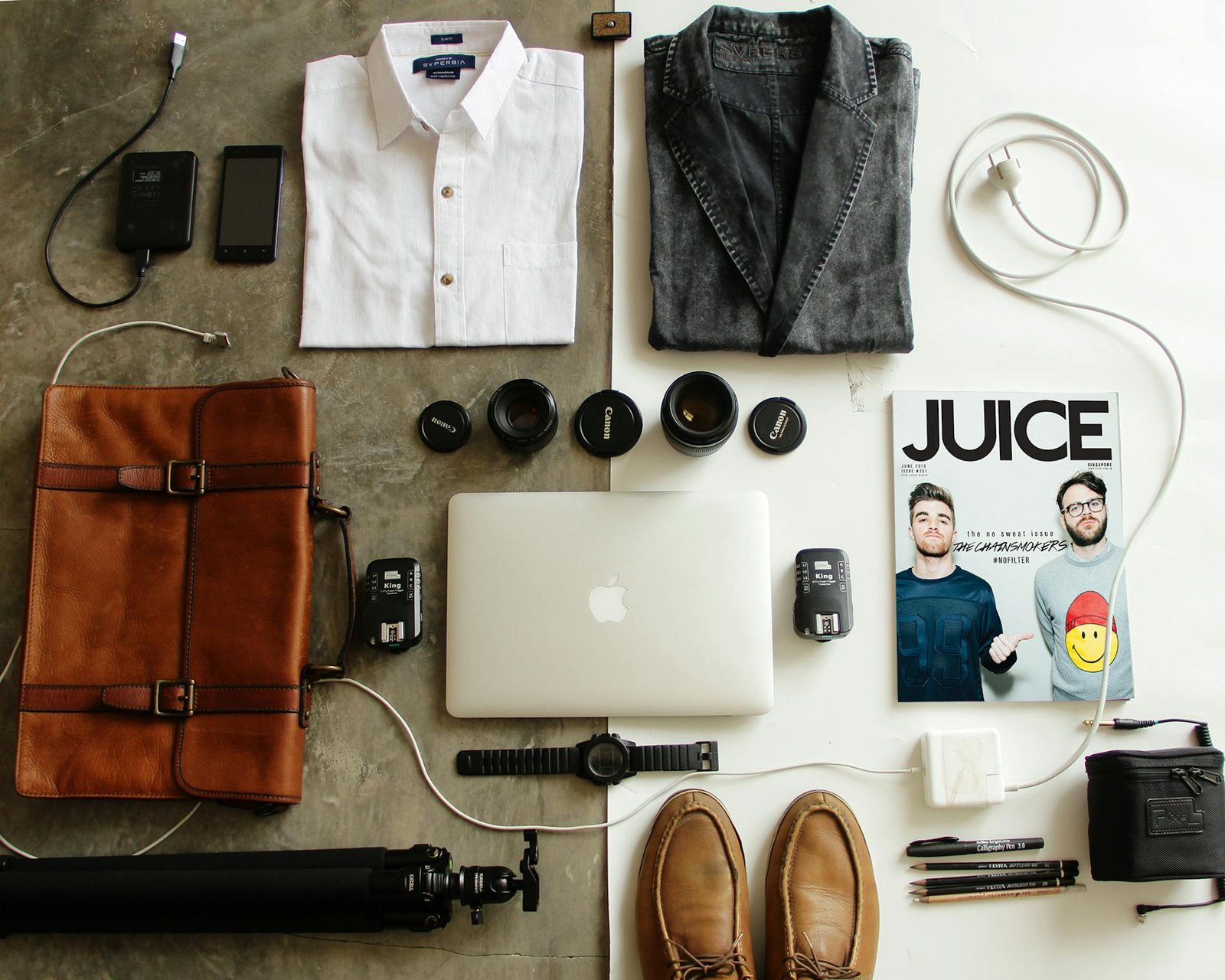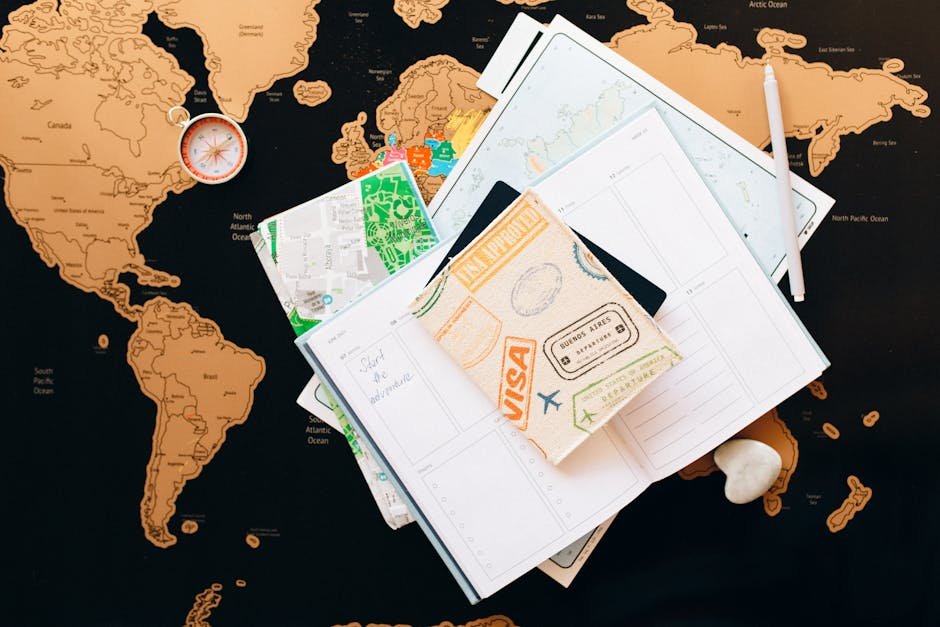Are you ready to become a digital nomad? That’s a huge step! This lifestyle offers amazing freedom. You can work from anywhere in the world. However, starting out can feel a bit scary. There are many things to learn and prepare. You need to know what to pack. You also need to set up your work. And you need to understand important things before you leave.
This guide will help new digital nomads get started in 2025. We will break down everything you need. This includes essential packing lists. We’ll also cover how to prepare your work environment. Finally, we’ll share key insights to help you succeed. Get ready to turn your dream of working from anywhere into a real adventure!
Part 1: What to Pack – Your Essential Gear for the Road
Your backpack or suitcase becomes your entire home. Therefore, packing smart is vital. Every item should be useful and versatile. Aim for a minimalist approach.
Clothing: Light, Layered, and Smart
When packing clothes, think about weight and space. You want clothes that dry fast and can be mixed and matched.
- Roll Your Clothes: This simple trick saves a lot of space. It also helps prevent wrinkles. Many experienced travelers use this method.
- Packing Cubes: These small zippered bags are game-changers. They compress your clothes. They also keep everything organized. You’ll find specific items much faster with them.
- Versatile Items: Choose neutral colors like black, grey, blue, or white. These items can be worn in many combinations. Focus on fabrics that dry quickly, especially if you plan to wash clothes by hand often.
- Layering System: Bring clothes you can easily layer. This helps you adapt to different temperatures. A light jacket, a rain shell, and a few basic tops are essential. For colder places, add a warm fleece or sweater.
- Underwear & Socks: Pack enough for about a week. Look for quick-drying and odor-resistant options. This helps reduce laundry frequency.
- Footwear: Limit yourself to two or three pairs. One comfortable pair of walking shoes is a must. Also, bring sandals or flip-flops. If you plan to go to fancier places, one dressier pair might be useful.
- Swimwear: Always pack at least one swimsuit. You never know when you’ll find a beach, pool, or hot spring.
- Small Laundry Kit: A small amount of detergent and a universal sink stopper can be very handy. You can wash small items in your hotel sink. A portable clothesline is also useful.
Toiletries & Personal Care: Travel-Sized Smartly
While you can buy most toiletries anywhere, bring your favorites to start.
- Travel-Sized Bottles: Use reusable travel-sized bottles. Fill them with your favorite shampoo, conditioner, and body wash. This saves space and meets airline rules.
- Solid Toiletries: Consider solid shampoo bars, soap, or deodorant. They don’t count as liquids. They also last longer.
- Microfiber Towel: A quick-drying microfiber towel is very practical. It’s lighter and dries faster than a regular towel. This is especially useful for hostels or beach trips.
- Basic First-Aid Kit: Include pain relievers, bandages, antiseptic wipes, and any personal medications. Always carry prescription meds in their original packaging. Also, bring extra copies of prescriptions.
- Sunscreen & Insect Repellent: These are vital for many destinations. They protect your skin and prevent bites.
Tech Gear: Your Mobile Office on the Go
Your tech is your livelihood. Therefore, protect it well and keep it functional.
- Laptop: This is your primary work tool. Invest in a lightweight yet powerful laptop. Make sure it can handle your tasks. Consider battery life carefully.
- Chargers and Adapters: Bring all chargers for your laptop, phone, and other devices. Crucially, pack a universal travel adapter. This lets you plug in your devices in any country. Some adapters also have USB ports.
- Portable Monitor (Optional): Many nomads find a small, lightweight portable monitor helpful. It acts as a second screen, which can greatly increase productivity.
- Noise-Cancelling Headphones: These are essential. They help you focus in noisy cafes, airports, or shared living spaces. They are also great for long flights.
- Portable Hard Drive / SSD & Cloud Storage: Always back up your important files. Use an external hard drive or solid-state drive (SSD). Also, use cloud services like Google Drive or Dropbox. This protects your data if your laptop is lost or damaged.
- Power Bank: A high-capacity power bank is a lifesaver. It keeps your phone, tablet, and other small devices charged when outlets are scarce.
- Unlocked Smartphone: An unlocked phone allows you to buy local SIM cards. This saves you a lot on roaming charges and gives you local data access.
- Webcam and Microphone (Optional): If your laptop’s built-in camera or mic isn’t great, consider a small external one. This improves your video call quality.
- Electronics Organizer Bag: This keeps all your cables, adapters, and small tech items tidy. No more tangled messes!
For more detailed information on specific devices and tools that digital nomads often use, check out our comprehensive guide on Digital Nomads Gear & Tools.
Part 2: Setting Up Your Digital Nomad Life – Systems and Habits
Packing is just the first step. You also need to prepare your work systems and daily habits. This ensures a smooth transition.
Work Setup: Ensuring Productivity Anywhere
Your work is why you’re a nomad. Therefore, make sure your setup supports it.
- Reliable Internet Access: Your job relies on a good internet connection. Research internet providers and typical speeds in your chosen destination. Look for places with fiber optic internet where possible. Consider hotels or Airbnbs that promise fast Wi-Fi.
- Backup Internet Solutions: Don’t rely on just one source. A portable Wi-Fi hotspot device is great for emergencies. Alternatively, consider an eSIM with a large data plan. This allows you to tether your laptop to your phone.
- Coworking Spaces: Consider joining a coworking space. Many cities popular with nomads have them. They offer stable internet, ergonomic chairs, and a professional work environment. They also provide a great way to meet other nomads.
- Ergonomics (Basic Travel Setup): Even on the go, try to maintain good posture. A lightweight, portable laptop stand can elevate your screen to eye level. Combine this with a compact external keyboard and mouse. These small additions prevent neck, back, and wrist pain over time.
- Time Zone Management: You might work with clients or teams in different time zones. Plan your work hours carefully. Use a world clock app to keep track. Clearly communicate your availability.
- Virtual Mailbox Service: This gives you a physical address in your home country. They can receive mail and scan it to you digitally. This is very useful for banking, taxes, and personal mail.
Financial Setup: Managing Money Across Borders
Smart money management is vital for financial security as a nomad.
- No Foreign Transaction Fee Cards: Get a debit or credit card that charges zero fees for international purchases and ATM withdrawals. This saves a lot of money over time.
- Online Banking: Ensure your bank offers robust online and mobile banking. You need to manage your accounts easily from anywhere.
- Budgeting and Tracking: Use a budgeting app or spreadsheet. Track all your income and expenses. This helps you understand where your money goes. It also ensures you stay within your budget. Apps like Expensify or Mint are helpful.
- Emergency Fund: This is non-negotiable. Have at least 3-6 months of living expenses saved. This covers unexpected costs. It also helps during slow work periods or if you face a medical emergency.
- Multiple Payment Methods: Carry a few different credit and debit cards. Keep them in separate places. This way, if one is lost or stolen, you have backups. Also, consider setting up a digital wallet like Google Pay or Apple Pay.
- International Money Transfer Services: Research services like Wise (formerly TransferWise) or Revolut. They offer better exchange rates and lower fees for international money transfers than traditional banks.
Communication & Security
Protecting your data and staying connected is very important.
- Virtual Private Network (VPN): A VPN is crucial for online security. It encrypts your internet connection. This is especially important when using public Wi-Fi networks in cafes or airports.
- Cloud Storage & Data Backup: Continue to back up all your important files to the cloud. Google Drive, Dropbox, or OneDrive are good options. Also, keep copies of vital documents like your passport, visa, and insurance policies in the cloud.
- Password Manager: Use a strong password manager (e.g., LastPass, 1Password). This helps you create and store complex passwords securely.
- Inform Your Bank & Family: Always tell your bank about your travel plans. This prevents them from freezing your cards due to unusual activity. Also, share your itinerary with family or a trusted friend. This is a good safety practice.
Part 3: What to Know Before You Go – Essential Preparations
A smooth digital nomad journey starts with good planning. These tips help you avoid common beginner mistakes.
Legal & Administrative Deep Dive
Don’t overlook the legal side of nomad life.
- Visa and Entry Requirements: This is paramount. Research the visa requirements for every country you plan to visit. Some countries now offer specific Digital Nomad Visas (e.g., Portugal, Spain, Croatia). Others may require a tourist visa, which often has strict limits on stay duration. Always check official government websites.
- Visa Length and Overstaying: Understand how long you can legally stay in each country. Overstaying a visa can lead to fines, deportation, or bans from future entry. Plan your itinerary to respect these limits.
- Taxes: This is complex. Your tax obligations depend on your nationality, where you earn your money, and how long you stay in each country. It’s crucial to consult a tax advisor specializing in international tax law. They can help you understand your situation and avoid legal issues.
- Health Insurance: Comprehensive travel insurance is essential. It should cover medical emergencies, accidents, and even trip cancellations. Do not leave home without it. Look for plans designed for digital nomads, like SafetyWing or Genki, which offer flexible global coverage.
- Vaccinations & Health Checks: Visit your doctor several weeks before you leave. Discuss your travel plans and get any necessary vaccinations. Also, consider routine health check-ups before you embark on a long journey.
Cultural Immersion & Practical Skills
Embrace the local experience and be ready for anything.
- Basic Language Phrases: Learn a few basic phrases in the local language of your first destination. Even “hello,” “thank you,” “please,” and “excuse me” go a long way. This shows respect and makes interactions smoother.
- Cultural Norms and Etiquette: Research local customs, social etiquette, and traditions. This helps you fit in better. It also prevents accidental offense. For example, dress codes, tipping habits, or greetings can vary widely.
- Local SIM Cards: Learn how to buy and activate local SIM cards upon arrival. This provides reliable and affordable internet and phone service.
- Public Transportation: Familiarize yourself with the local public transport system. This includes metros, buses, and trams. Knowing how to get around efficiently saves time and money.
- Safety Awareness: Research common scams or safety concerns in your target cities. Learn about safe neighborhoods. Be aware of your surroundings, especially at night. Keep valuables secure.
- Adaptability and Flexibility: The digital nomad lifestyle often involves unexpected changes. Be ready to adapt to new situations. This includes internet outages, cancelled flights, or last-minute accommodation changes. A flexible mindset is your best asset.
- Problem-Solving Skills: You will face challenges. Develop strong problem-solving skills. Learn to research solutions quickly. This could involve fixing a tech issue or navigating a local bureaucracy.
Mindset & Community
The mental side of nomad life is as important as the practical.
- Define Your “Why”: Understand your core reasons for becoming a digital nomad. This “why” will keep you motivated during challenging times.
- Build a Network: Loneliness can be a challenge. Join online digital nomad communities (e.g., Facebook groups, NomadList). Attend local meetups or events. Connecting with other nomads offers support and friendship.
- Set Boundaries: It’s easy to overwork when your office is everywhere. Set clear work hours. Take regular breaks. Separate work time from leisure time. This helps prevent burnout.
- Embrace Discomfort: New experiences often come with some discomfort. Be open to trying new things. Be okay with moments of uncertainty. This is part of the adventure.
- Digital Detox: Schedule time away from screens. Explore your new surroundings. Engage in local activities. This helps maintain a healthy work-life balance.
Final Thoughts: Your Nomad Journey Begins!
Becoming a digital nomad is a transformative experience. It brings immense freedom and personal growth. By carefully planning and preparing, you can ease into this lifestyle. Focus on packing smart, setting up reliable work systems, and learning about your destinations.
Remember, your first journey won’t be perfect. There will be learning curves. However, with this beginner’s kit and a positive attitude, you are well-equipped to start. Embrace the adventure, enjoy the flexibility, and make the most of your new life working from anywhere!







